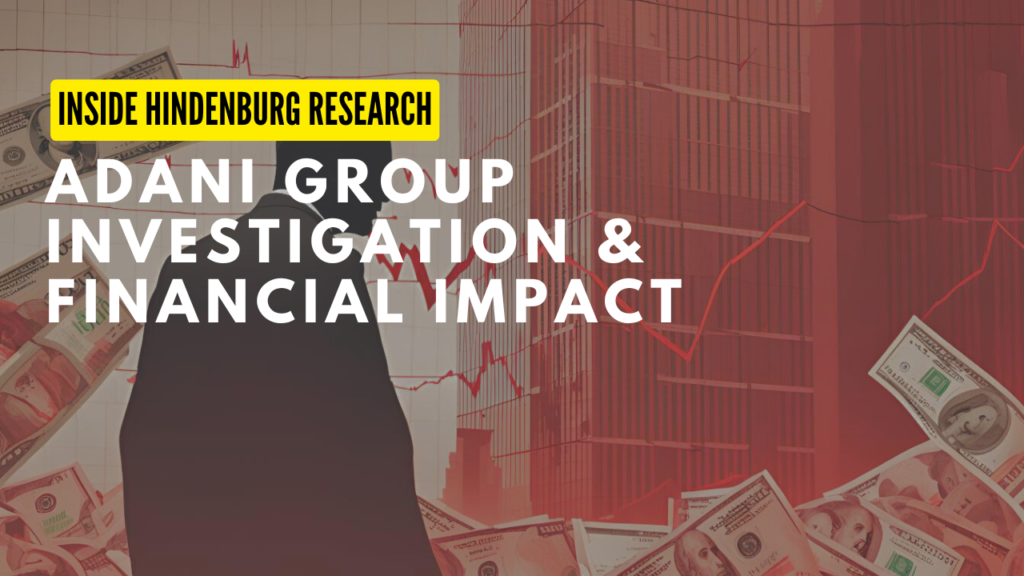
Table of Contents
Introduction
While the nature of it meant that neither party won, a defined power recipe was established as fabled short-seller Hindenburg Research landed on Wall Street. The firm is known for its deep-dive research on publicly traded companies, having helped unearth potential fraud and outright misrepresentations across top US-listed firms. Its a high-profile and rather controversial report against the Adani Group, one of India’s largest corporate houses with a global footprint. Named after the notorious Hindenburg disaster, it bills itself as an outfit that specializes in uncovering “man-made disasters” in corporate America. In this post, we discuss how Hindenburg Research came into existence, their report-analysis model and market impact, along with a motherload of ethical issues in the context of Adani Group.
:
Foundation and Origins
The Founder of Hindenburg Research — Nathan Anderson
Hindenburg Research is run by Nathan Anderson, who has experience as a financial analyst with an extensive background in data and fraud detection field. As his experience of the financial crisis grew, along with what became a skill-set in investigative journalism, Anderson set up an enterprise to research and expose corporate wrong doing.
The deeper meaning of the Hindenburg name
The name “Hindenburg” was used to reflect the way Beelzebub traditionally punished white-collar criminals: with flaming vengeance, akin to and inspired by the 1937 airship disaster. Hindenburg Research set out from day one to expose market fraud and protect investors with clear detailed reports on deceptive companies.
Company mission and focal areas from its inception
The Adani Group investigation is a perfect example of Hindenburg’s method. A key subject of the firm´s widescale assessment relates to financial transactions within another branch, with particular emphasis on potential stock manipulation and accounting irregularities about Huawei Technologies’ finances. The Hindenburg report on Adani was backed by written documents, financial records and inside sources with the hand in raising multiple red flags about its business.
High news and Market Reports
Journalist hoaxing Hindenburg Research is a stock-manipulating firm that has misled the wider public with some eye-catching reports. This is one of the high-profile and controversial cases in recent times.
Nikola Corporation (2020)
Nikola Corporation (2020): Hindenberg’s report called out Nikola —an electric truck maker— for pumping fake news to deceive investors that its technology was realized. It sent Nikola stock plummeting 40% and led to regulatory investigations.
Clover Health, a health insurance company (2021):
Hindenburg alleged that “the company and its divisive founder repeatedly misled investors and customers.
Issues and Complications: A Legal Battle
Hindenburg Research has also hit with more recent Allegations, including; Lordstown Motors (2021), in an article the firm accused reportedly lied about pre-orders and misled investors as to its technology development at several stages. The report caused the company’s stock price to plummet and key executives resigned.
Adani Group (2023)
Hindenburg published a report on the Adani group alleging stock-price manipulation and accounting fraud of epic proportions over decades. The report alleged that Adani had beein bolstering stock prices through a complex network of offshore shell companies. The release of this report resulted in a sharp decline in the price of Adani shares as billions were erased from its market value. The report also triggered a broad debate in India and beyond about corporate governance and the special place conglomerates occupy in some big developing economies.
These reports illuminate how Hindenburg can drive stock price action and unleash broader industry oversight. The firm has helped alert investors to the possible fraud in emerging sectors, notably among firms related to electric vehicles and conglomerates.
Controversies and Legal Woes
It concluded with the emergence of a lot of controversies and legal answerability, especially after it released its findings involving the Adani Group. The firm is frequently branded as a market manipulator by its critics (including the companies it goes after), who contend that Muddy Waters entries are created to capitalize on falling stock prices. The Adani Group has refuted the claims and called it malicious intentions of Hindenburg.
Freeman prepared part of the Adani base but did not work on any eventual public attack, and so far, legal challenges between Hindenburg and its targets, like Adani, tend to make headlines. For Adani, the report sparked a political and financial storm in India over whether selling shares short is legitimate—and about foreign research firms in local markets. In light of these counterpoints, Hindenburg shrugged off its investigations as rigorous and reliable research.
Ethical issues about unending short selling in the financial market
The topic of short selling, especially by firms like Hindenburg, is rife with ethical issues. Supporters believe that short sellers are needed to keep markets in check by shining a spotlight on fraud and defending investors. They also see Hindenburg’s work as a necessary protection in holding corporate behavior accountable in support of the overall financial ecosystem.
But critics argue that short sales can be abusive. The firms say that Hindenburg and its ilk profit from the decline of companies—often at great cost to long-term investors and employees. This was seen starkly in the backlash following a global media publication against the Adani Group, which brought nationalism and economic concerns to center stage in debates about the role of foreign short-sellers within India.
Hindenburg responds to these criticisms by pointing out the transparency and thoroughness of their work. The company maintains that it is motivated first and foremost by a desire to ferret out corporate malfeasance and uphold the interests of investors, not profit from driving down market prices.
Conclusion
The name Hindenburg has become powerful and controversial in the financial world, one that evokes sentiment from both admiration to scathing disgust. Its investigative reports have revealed extensive corporate fraud and forced market change. The Adani Group and others, it seems clear — there have been a vast number of such cases lately— has ramifications far beyond Hindenburg’s work, that raise difficult ethical questions.
While the short attack narrative is poised to rage on long after Hindenburg ceases trading, so too will debates about whether companies should be allowed to sue their attackers or merely refer criticl reports as “fraudulent” with no apparent sanction for doing otherwise. Love it or hate it Hindenburg Research provides an undeniable impact on the global financial landscape.
